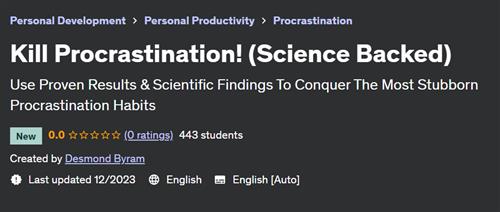Kill Procrastination! (Science Backed)

Last updated 12/2023
Duration: 1h17m | Video: .MP4, 1280×720 30 fps | Audio: AAC, 48 kHz, 2ch | Size: 178 MB
Genre: eLearning | Language: English
Use Proven Results & Scientific Findings To Conquer The Most Stubborn Procrastination Habits
What you’ll learn
Overcome the fear of failure or fear of success
Make sure you don’t have unreasonably big goals and expectations in life
Improve your lifestyle to have more energy
Engage in assertiveness training
Requirements
None Needed
Description
Overcoming procrastination is a common challenge, and leveraging proven results and scientific findings can be a powerful approach. Here are some strategies backed by research to help conquer stubborn procrastination habits
1. Implementation Intentions
Scientific Basis
Research suggests that forming implementation intentions, which are specific plans that outline when, where, and how a task will be completed, can be effective in reducing procrastination.
Application
Clearly define your tasks and create a specific plan for when and where you will work on them. This creates a mental link between the situation and the desired behavior.
2. Break Tasks Into Smaller Steps
Scientific Basis
The Zeigarnik Effect indicates that people are more likely to remember uncompleted or interrupted tasks. Breaking tasks into smaller, manageable steps can make them less overwhelming.
Application
Divide large tasks into smaller, actionable steps. Focus on completing one step at a time to build momentum.
3. Use the Pomodoro Technique
Scientific Basis
The Pomodoro Technique, which involves working in short, focused bursts followed by breaks, is supported by research showing that brief breaks can help maintain a high level of focus.
Application
Set a timer for a specific work period (e.g., 25 minutes), followed by a short break. Repeat this cycle, adjusting as needed.
4. Mindfulness and Self-Compassion
Scientific Basis
Mindfulness practices have been linked to improved self-regulation and decreased procrastination. Self-compassion reduces the negative impact of failure and fosters resilience.
Application
Incorporate mindfulness techniques, such as meditation, into your routine. Practice self-compassion by treating yourself with kindness when facing challenges.
5. Utilize the Two-Minute Rule
Scientific Basis
Based on the idea that many tasks can be started and completed in just a few minutes, the Two-Minute Rule helps overcome the initial resistance to starting a task.
Application
If a task takes less than two minutes, do it immediately. This helps to build a habit of starting tasks promptly.
6. Social Accountability
Scientific Basis
Social support and accountability can significantly impact behavior change. Sharing goals with others can enhance commitment.
Application
Share your goals with friends, family, or colleagues. Consider finding an accountability partner to provide mutual support.
7. Reward Yourself
Scientific Basis
Behavioral psychology suggests that positive reinforcement can strengthen desired behaviors. Rewards create a positive association with completing tasks.
Application
Set up a system of rewards for accomplishing tasks. This can be as simple as taking a break, enjoying a treat, or engaging in a preferred activity.
8. Understand Your "Why"
Scientific Basis
Connecting tasks to personal values and long-term goals enhances motivation. This aligns with self-determination theory.
Application
Clearly define the purpose behind your tasks. Understand how they contribute to your broader goals and values.
9. Cognitive Restructuring
Scientific Basis
Cognitive-behavioral techniques, including cognitive restructuring, focus on changing negative thought patterns associated with procrastination.
Application
Identify and challenge negative thoughts related to tasks. Replace them with positive and empowering thoughts.
10. Environment Design
Scientific Basis
Behavioral science supports the idea that modifying your environment can influence behavior. Creating a conducive workspace reduces barriers to starting tasks.
Application
Organize your workspace and eliminate distractions to make it easier to focus on your work.
By incorporating these strategies into your daily routine, you can leverage scientific insights to overcome procrastination and enhance your productivity. Experiment with these techniques and adapt them to suit your individual preferences and circumstances.
Who this course is for
Eager Learners
Homepage
https://www.udemy.com/course/kill-procrastination-young-professionals-science-backed/
Say “Thank You”
DONWLOAD FROM RAPIDGATOR
vrmex.Kill.Procrastination.Science.Backed.rar.html
DONWLOAD FROM UPLOADGIG
vrmex.Kill.Procrastination.Science.Backed.rar
DOWNLOAD FROM NITROFLARE
vrmex.Kill.Procrastination.Science.Backed.rar
fikper.com:
vrmex.Kill.Procrastination.Science.Backed.rar.html